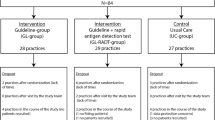Abstract
Recent surveys in Vancouver showed most healthy children were colonized withβ-lactamaseproducingHaemophilus parainfluenzae. Such organisms might alter the effects of penicillins on throat bacteria by local inactivation. To test this hypothesis in vitro, three isolates ofβ-lactamaseproducingHaemophilus parainfluenzae were each mixed on a membrane with ampicillin-sensitive strains ofHaemophilus influenzae type b or group AStreptococcus pyogenes and exposed to ampicillin. When tested alone, susceptible strains were rapidly killed but when tested together with aβ-lactamase producer, they were protected, indicating efficient ampicillin degradation byHaemophilus parainfluenzae strains. If similar interactions occur in vivo, the effects ofβ-lactams on throat bacteria could be significantly altered in the presence ofβ-lactamase-producingHaemophilus parainfluenzae.
Similar content being viewed by others
References
Scheifele, D. W., Fussell, S. J.: Frequency of ampicillin-resistantHaemophilus parainfluenzae in children. Journal of Infectious Diseases 1981, 143: 495–498.
Bernstein, S. H., Stillerman, M., Allerhand, J.: Demonstration of penicillin inhibition by pharyngeal microflora in patients treated for streptococcal pharyngitis. Journal of Laboratory and Clinical Medicine 1964, 63: 14–20.
Frank, P. F., Miller, J. M.: Antagonistic effect of a penicillinase-producing staphylococcus on penicillin therapy of a streptococcal throat infection. American Journal of Medicine and Science 1962, 243: 582–588.
Smith, A. L., Smith, D. H., Averill, D. R., Marino, J., Moxon, E. R.: Production ofHaemophilus influenzae b meningitis in infant rats by intraperitioneal inoculation. Infection and Immunity 1973, 8: 278–290.
Emerson, B. B., Smith, A. L., Harding, A. L., Smith, D. H.:Haemophilus influenzae type b susceptibility to 17 antibiotics. Journal of Pediatrics 1975, 86: 617–620.
Kilian, M., Schiott, C. R.: Haemophili and related bacteria in the human oral cavity. Archives of Oral Biology 1975, 20: 791–796.
Sims, W.: Oral haemophili. Journal of Medical Microbiology 1970, 3: 615–625.
Scheifele, D. W.: Ampicillin-resistantHaemophilus influenzae in Canada: nationwide survey of hospital laboratories. Canadian Medical Association Journal 1979, 121: 198–202.
Scheifele, D. W., Fussell, S. J., Roberts, M. C.: Characterization of ampicillin-resistantHaemophilus parainfluenzae. Infection and Immunity 1982, 21: 734–739.
Brook, I., Yocum, P., Friedman, E. M.: Aerobic and anaerobic bacteria in tonsils of children with recurrent tonsillitis. Annals of Otology, Rhinology and Laryngology 1980, 90: 261–263.
Brook, I., Leyva, F.: The treatment of the carrier state of group A beta-hemolytic streptococci with clindamycin. Chemotherapy 1981, 27: 360–367.
Stilland, R. M., Shotts, N.: Antibiotic-resistant streptococci in the mouths of children treated with penicillin. Lancet 1967, i: 405–408.
McCurdy, R. S., Neter, E.: Effects of penicillin and broadspectrum antibiotics on the emergence of gram-negative bacillary flora in the upper respiratory tract of infants. Pediatrics 1952, 9: 572–576.
Sanders, C. C., Sanders, W. E., Harrowe, D. J.: Effects of orally-administered antibiotics on the normal throat flora and its ability to interfere with group A streptococci. Infection and Immunity 1976, 13: 808–812.
Author information
Authors and Affiliations
Rights and permissions
About this article
Cite this article
Scheifele, D.W., Fussell, S.J. Potential significance of colonization with beta-lactamase-producingHaemophilus parainfluenzae in children. Eur. J. Clin. Microbiol. 2, 196–199 (1983). https://doi.org/10.1007/BF02029515
Issue Date:
DOI: https://doi.org/10.1007/BF02029515




